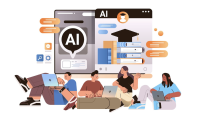Search
There are 5 results.
Tag
Tag
All (27)
Analytics (1)
Assessments (5)
Backwards Design (1)
Belonging (1)
Canvas (1)
Communication (2)
Community (1)
Competency-Based Education (1)
Content Creation (7)
Copyright (1)
Course Maintenance (2)
Course Preparation (3)
Equity (1)
Faculty Presence (1)
Faculty Support (2)
Feedback (1)
Formative Assessments (2)
Generative AI (7)
Grading (2)
Images (1)
Learning Objectives (1)
Multimodality (1)
Peer Review (1)
PowerPoint (1)
Presentations (1)
Revising (1)
Revision (1)
Rubrics (2)
Video (1)
Quizzes for the Multimodal Course
From trivia games to final exams, quizzing tools have a variety of uses for learning as well as assessment. Exams and quizzes have a particularly plentiful range of possibilities in a multimodal or hybrid course, where they can be administered synchronously or asynchronously. Research suggests that the presentation of a tool influences student behavior in response to the tool. When comparing two student discussion boards, one an ungraded discussion and one a graded replacement for a final exam, Cheng et al. (2013) found that students displayed more knowledge on the graded board but more evidence of learning on the ungraded board. The students who participated in the study were more likely to grapple with new ideas when the stakes were low but more eager to showcase topics they were confident about when their responses would have a greater impact on their grades. When considering quizzing tools, we recommend allowing your course goals to guide your usage.
Beyond Traditional Grades: Alternative Assessment Methods
As educators navigate the challenges and opportunities presented by generative AI (genAI), many are reconsidering traditional assessment approaches. Alternative assessment methods offer innovative ways to evaluate student learning that go beyond conventional grading systems, focusing on authentic learning, skill development, and meaningful engagement. These approaches not only address the challenges posed by AI but also align with research on effective learning and motivation (Furze, 2023; Pitts Donahoe, 2023).
The Need to Rethink Assessments in the Age of Generative AI
The rapid advancement of generative artificial intelligence (genAI) technologies has sent shockwaves through the education sector, sparking intense debates about academic integrity, assessment practices, and student learning (Roe et al., 2023; Rudolph et al., 2023; Susnjak & McIntosh, 2024; Swiecki et al., 2022; Yeo, 2023). Since the public release of ChatGPT in November 2022, educators have grappled with concerns about cheating and the potential erosion of traditional academic values (Gorichanaz, 2023; Sullivan et al., 2023). However, as our understanding of genAI capabilities evolves, so too must our approach to assessment and teaching (Lodge et al., 2023).
Fostering Deep Learning and Motivation in the AI Era
As generative artificial intelligence (genAI) reshapes the educational landscape, faculty must rethink traditional assessment strategies to maintain academic integrity and real-world relevance. This piece explores strategies for creating effective assessments in an AI-mediated world, focusing on two key areas: collaborative activities that develop essential human skills, and formative assessments that emphasize personal growth and deep learning. These approaches not only address concerns about AI misuse but also prepare students for future workplaces where human capabilities will complement AI tools.





